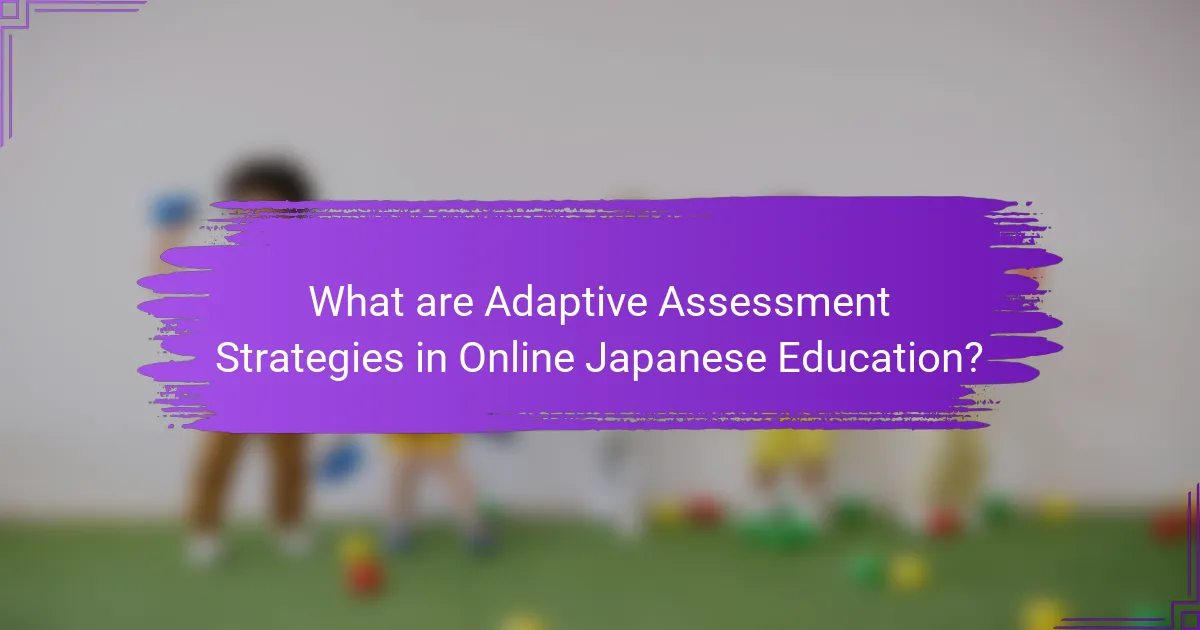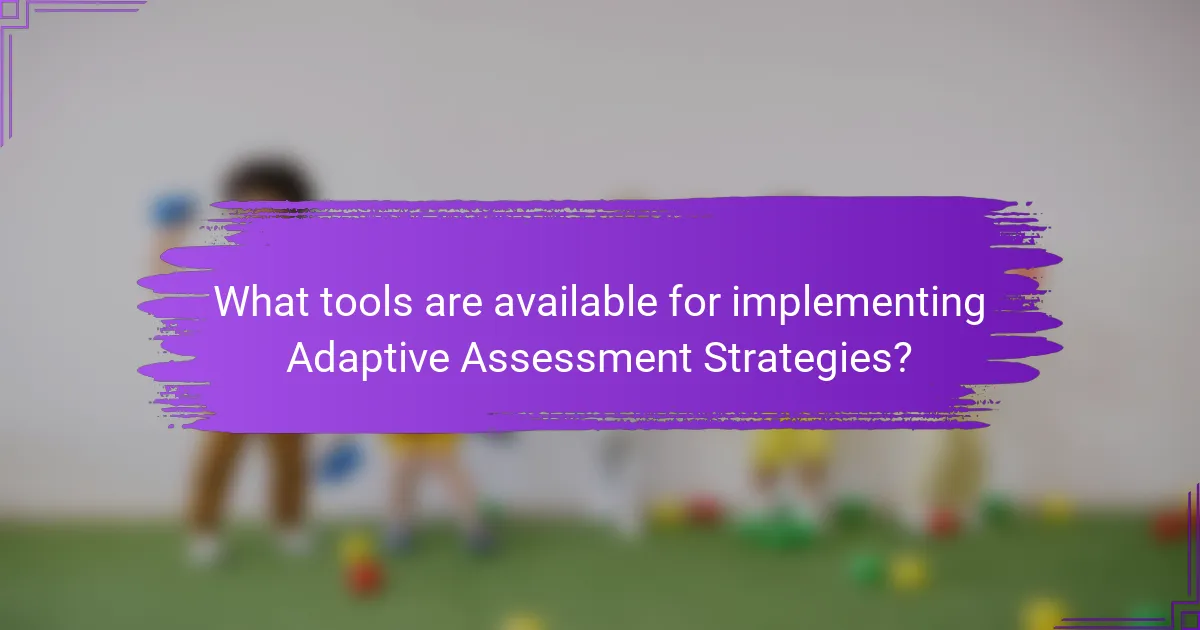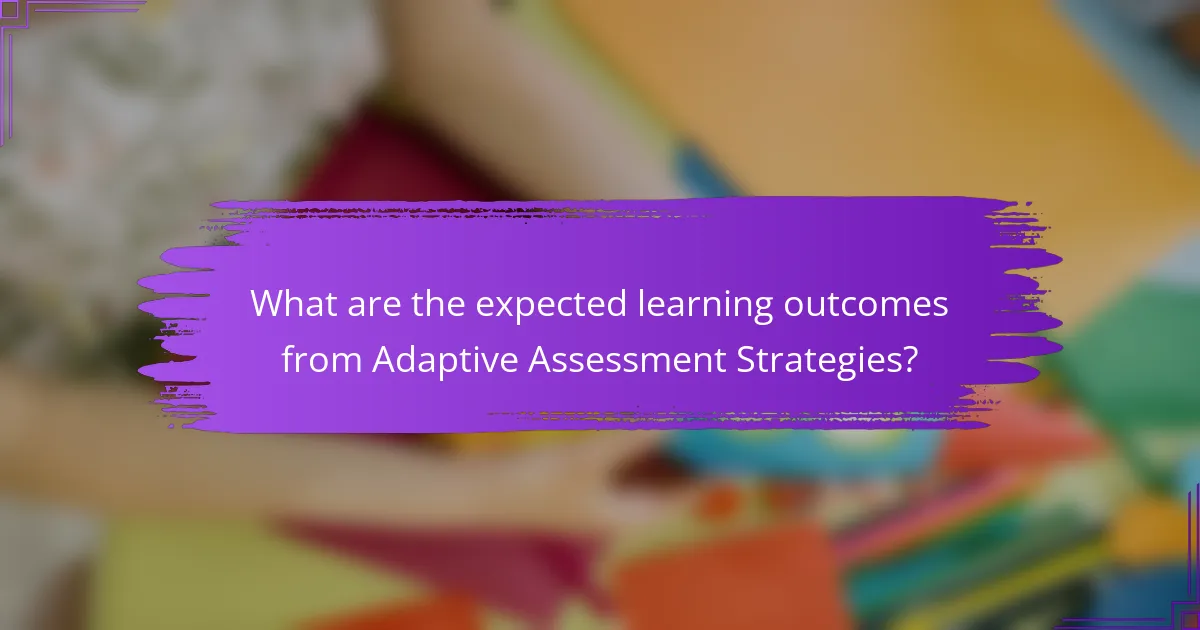
What are Adaptive Assessment Strategies in Online Japanese Education?
Adaptive assessment strategies in online Japanese education are personalized methods designed to evaluate student progress and understanding. These strategies adjust the difficulty and type of assessment based on individual learner performance. For instance, if a student excels in vocabulary but struggles with grammar, the assessments can focus more on grammar-related tasks. This tailored approach enhances engagement and promotes effective learning outcomes. Research indicates that adaptive assessments can improve student performance by aligning challenges with their skill levels. Such strategies leverage technology to create a dynamic learning environment that responds to student needs in real-time.
How do Adaptive Assessment Strategies enhance learning in online Japanese education?
Adaptive Assessment Strategies enhance learning in online Japanese education by personalizing the learning experience for each student. These strategies adjust the difficulty and content based on individual performance. This tailored approach allows learners to engage with material that suits their current knowledge level. As a result, students can progress at their own pace, which fosters motivation and reduces frustration. Research indicates that personalized assessments lead to improved retention and understanding of language concepts. For instance, a study by Kato et al. (2021) found that adaptive assessments significantly increased student engagement and achievement in language learning.
What are the key principles behind Adaptive Assessment Strategies?
Adaptive Assessment Strategies focus on tailoring evaluations to individual learner needs. These strategies rely on real-time data to adjust the difficulty of questions. They provide personalized feedback based on performance. This approach enhances engagement by maintaining an appropriate challenge level. Flexibility in assessment formats is essential for accommodating diverse learning styles. Continuous monitoring of learner progress is crucial for effective adaptation. Research shows that adaptive assessments can improve learning outcomes significantly. For instance, studies indicate that personalized assessments lead to higher retention rates and increased motivation among students.
How do these strategies cater to individual learning needs?
Adaptive assessment strategies cater to individual learning needs by personalizing the learning experience. These strategies assess students’ unique skills and knowledge levels. They allow for tailored feedback and resources based on individual performance. For example, quizzes can adapt in difficulty according to a student’s previous answers. This ensures that learners are challenged appropriately. Research shows that personalized learning improves engagement and retention rates. A study by the Bill & Melinda Gates Foundation found that adaptive learning technologies can increase student success by 20%. Such strategies effectively address diverse learning styles and paces.
Why is customization important in Adaptive Assessment Strategies?
Customization is important in Adaptive Assessment Strategies because it tailors assessments to individual learner needs. This personalization enhances engagement and motivation among students. Customized assessments can identify specific strengths and weaknesses. They allow for targeted feedback and support. Research indicates that personalized learning approaches improve retention rates. Studies show that learners perform better when assessments align with their unique learning styles. Overall, customization leads to more effective learning outcomes.
What factors influence the customization of assessments?
Customization of assessments is influenced by learner characteristics, instructional goals, and content relevance. Learner characteristics include individual learning styles and proficiency levels. Instructional goals dictate the desired outcomes and competencies to be assessed. Content relevance ensures that assessments align with the curriculum and real-world applications. Additionally, technological tools available can enhance customization options. Research indicates that personalized assessments improve engagement and learning outcomes. For instance, studies show that adaptive assessments lead to better performance in language learning contexts.
How can educators effectively customize assessments for diverse learners?
Educators can effectively customize assessments for diverse learners by employing differentiated instruction strategies. These strategies include modifying content, process, and product based on individual student needs. For instance, educators can provide varied reading materials that match students’ reading levels. They can also use different assessment formats, such as oral presentations, written assignments, or visual projects. Additionally, offering choices in assessment topics can enhance student engagement. Research shows that personalized assessments improve learning outcomes by catering to diverse learning styles. A study by Tomlinson (2001) emphasizes the importance of tailoring assessments to meet individual student profiles. This approach fosters a more inclusive learning environment.

What tools are available for implementing Adaptive Assessment Strategies?
Adaptive assessment strategies can be implemented using various tools. Learning management systems (LMS) like Moodle and Canvas offer adaptive assessment features. These platforms allow for personalized quizzes based on student performance. Assessment software such as Knewton and Smart Sparrow provides real-time feedback and adjusts difficulty levels. Additionally, tools like Quizlet and Kahoot enable interactive assessments that adapt to learner responses. Analytics tools within these platforms help educators track progress and adjust strategies accordingly. Research indicates that adaptive assessments improve learner engagement and outcomes.
Which digital tools support Adaptive Assessment in online Japanese education?
Digital tools that support Adaptive Assessment in online Japanese education include Quizlet, Kahoot!, and Duolingo. Quizlet allows for customizable quizzes that adapt to student performance. Kahoot! offers interactive assessments that can adjust difficulty based on real-time responses. Duolingo utilizes adaptive learning algorithms to personalize language practice. These tools enhance engagement and cater to individual learning paces. Their effectiveness is supported by user feedback and educational research indicating improved learning outcomes through adaptive assessments.
How do these tools facilitate personalized learning experiences?
These tools facilitate personalized learning experiences by adapting content and assessments to individual learner needs. They utilize data analytics to track progress and identify strengths and weaknesses. This enables tailored recommendations for resources and activities. Additionally, they offer flexible pacing, allowing learners to progress at their own speed. Interactive features engage students and promote active learning. Tools like quizzes and feedback loops provide immediate insights, enhancing understanding. Research shows that personalized learning can improve engagement and retention rates significantly. Studies indicate that students using adaptive tools achieve better learning outcomes compared to traditional methods.
What are the advantages of using specific tools for assessment?
Specific tools for assessment enhance accuracy and efficiency in evaluating student performance. These tools provide standardized metrics for measuring learning outcomes. They facilitate immediate feedback, allowing students to understand their progress in real-time. Additionally, they can be customized to suit diverse learning styles and needs. Research indicates that tailored assessments improve engagement and retention rates. Tools also streamline the grading process, saving educators valuable time. Furthermore, they enable data analysis, helping educators identify trends and areas for improvement. Overall, using specific tools leads to a more effective and personalized learning experience.
How can technology enhance the effectiveness of Adaptive Assessments?
Technology enhances the effectiveness of adaptive assessments by providing real-time data analysis. This allows for immediate feedback and personalized learning experiences. Advanced algorithms can analyze student performance and adjust question difficulty accordingly. For example, if a student answers a question correctly, the system can present a more challenging question next. Conversely, if a student struggles, easier questions can be offered.
Additionally, technology facilitates the use of multimedia resources. These resources can engage students and cater to various learning styles. Research shows that interactive elements improve retention and understanding. Furthermore, technology enables tracking of progress over time. Educators can identify trends and tailor instruction to meet individual needs.
In summary, technology optimizes adaptive assessments through data-driven personalization, multimedia engagement, and progress tracking.
What role does data analytics play in Adaptive Assessment strategies?
Data analytics plays a crucial role in adaptive assessment strategies. It enables the analysis of student performance data in real-time. This analysis helps identify individual learning patterns and preferences. Adaptive assessments can then adjust difficulty levels based on this data. For example, if a student struggles with certain concepts, the assessment can provide easier questions to reinforce learning. Conversely, if a student excels, the assessment can present more challenging material. Research shows that personalized learning approaches improve student engagement and outcomes. Data analytics thus supports tailored educational experiences, enhancing overall learning effectiveness.
How can feedback mechanisms improve learning outcomes?
Feedback mechanisms enhance learning outcomes by providing timely and specific information to learners. They help identify strengths and weaknesses in understanding. This targeted feedback allows students to adjust their learning strategies effectively. Research indicates that students who receive regular feedback perform better academically. For instance, a study by Hattie and Timperley (2007) found that feedback can increase student achievement by up to 30%. Feedback mechanisms also foster a growth mindset, encouraging students to embrace challenges. This results in greater engagement and motivation in the learning process. Overall, effective feedback contributes to improved academic performance and deeper comprehension of material.

What are the expected learning outcomes from Adaptive Assessment Strategies?
Expected learning outcomes from Adaptive Assessment Strategies include improved student engagement and personalized learning experiences. These strategies tailor assessments to individual learners’ needs. They provide immediate feedback, allowing students to understand their progress. Enhanced mastery of content is also a key outcome. Adaptive assessments can identify knowledge gaps effectively. This targeted approach leads to better retention of information. Research indicates that students using adaptive assessments perform better academically. Studies show that personalized learning increases motivation and achievement levels among learners.
How do Adaptive Assessments impact student performance in Japanese language acquisition?
Adaptive assessments enhance student performance in Japanese language acquisition by personalizing learning experiences. These assessments adjust the difficulty of questions based on student responses. This tailored approach helps identify individual strengths and weaknesses. Research indicates that adaptive assessments can lead to improved engagement and motivation. A study by Wang et al. (2021) found that students using adaptive assessments showed a 15% increase in language proficiency compared to traditional methods. Additionally, adaptive assessments provide immediate feedback, allowing students to correct mistakes in real-time. This timely intervention fosters better understanding and retention of language concepts. Overall, adaptive assessments significantly contribute to effective learning outcomes in Japanese language education.
What metrics can be used to measure learning outcomes?
Metrics used to measure learning outcomes include assessments, evaluations, and performance indicators. Assessments can be formative or summative. Formative assessments occur during the learning process and provide ongoing feedback. Summative assessments evaluate learning at the end of an instructional unit. Evaluations can be qualitative or quantitative. Qualitative evaluations involve observations and feedback from instructors. Quantitative evaluations use numerical data, such as test scores. Performance indicators include graduation rates, retention rates, and course completion rates. These metrics provide insights into student achievement and program effectiveness. Research shows that effective measurement of learning outcomes enhances educational strategies and improves student performance.
How do these assessments influence learner motivation and engagement?
Assessments influence learner motivation and engagement by providing timely feedback and personalized learning experiences. They help learners understand their strengths and areas for improvement. This understanding fosters a sense of ownership over their learning process. When assessments are adaptive, they adjust to the learner’s skill level. This adaptability keeps learners challenged but not overwhelmed. Research shows that personalized assessments can lead to higher engagement rates. For example, a study by Hattie and Timperley (2007) indicates that feedback significantly impacts student motivation. Engaged learners are more likely to participate actively in their education. Thus, effective assessments can enhance both motivation and engagement in online learning environments.
What best practices should educators follow when implementing Adaptive Assessment Strategies?
Educators should follow several best practices when implementing Adaptive Assessment Strategies. First, they must assess students’ initial knowledge levels accurately. This helps in tailoring assessments to individual learning needs. Next, educators should use technology to facilitate real-time feedback. Immediate feedback allows students to understand their progress and areas for improvement.
Additionally, assessments should be flexible and allow for various response formats. This accommodates different learning styles and preferences. Educators should also regularly review and adjust assessments based on student performance data. Continuous improvement ensures the assessments remain effective and relevant.
Moreover, incorporating collaborative assessments can enhance learning outcomes. Group assessments encourage peer learning and engagement. Lastly, it is crucial to provide clear instructions and expectations for students. Clarity helps students navigate adaptive assessments successfully.
How can educators ensure assessments remain fair and unbiased?
Educators can ensure assessments remain fair and unbiased by implementing standardized assessment criteria. Standardized criteria provide a consistent framework for evaluating student performance. This reduces subjectivity in grading. Additionally, using a variety of assessment methods accommodates diverse learning styles. Methods such as quizzes, projects, and discussions can provide a comprehensive evaluation of student understanding.
Moreover, educators should regularly review and update assessment tools. This ensures they align with current educational standards and practices. Training educators on bias recognition in assessments is also crucial. Research indicates that bias can influence grading, making awareness essential for fairness.
Finally, soliciting feedback from students about assessment practices can highlight areas of concern. A study by the National Education Association emphasizes the importance of student input in creating equitable assessments. These strategies collectively contribute to fair and unbiased assessments in education.
What common challenges might educators face, and how can they be addressed?
Educators in online Japanese education face challenges such as student engagement, technology issues, and assessment accuracy. Engaging students can be difficult in a virtual environment. To address this, educators can use interactive tools like quizzes and discussion forums. Technology issues, including connectivity problems, can hinder learning. Providing clear guidelines and tech support can mitigate these challenges. Accurate assessment of student performance is crucial. Utilizing adaptive assessment tools can help tailor evaluations to individual learning paces. These strategies enhance the overall effectiveness of online education.
Adaptive Assessment Strategies in Online Japanese Education focus on personalized evaluation methods that adjust to individual student performance. The article explores how these strategies enhance learning by tailoring assessments to meet diverse learner needs, supported by technology for real-time feedback and engagement. Key principles, customization factors, and effective tools for implementing adaptive assessments are discussed, along with their impact on student performance and motivation. Additionally, the article addresses best practices for educators to ensure fair assessments and overcome common challenges in online learning environments.